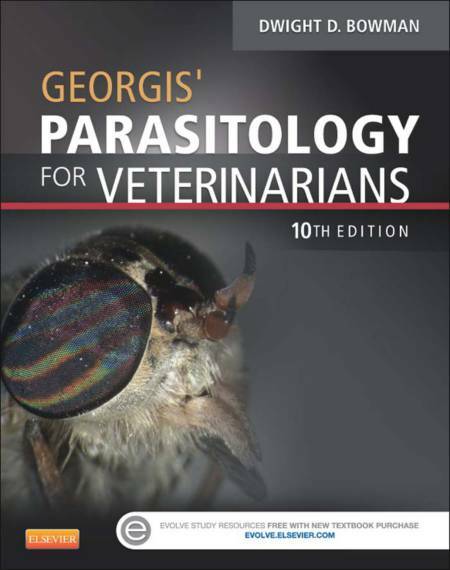Georgis’ Parasitology for Veterinarians, 10th Edition. In this, the tenth edition of Georgis’ Parasitology for Veterinarians, besides the usual updating of details in the text, there have been some significant changes.
Georgis’ Parasitology for Veterinarians, 10th Edition

These changes include altering the order of material presented in the chapter on arthropods, major organizational revisions in the chapter on the protista (protozoa) to match what appears to be the new “systematic synthesis,” an attempt to add more images and more reader-friendly text to the chapter on diagnostic parasitology, and finally the expansion of the table on antiparasite vaccines by Dr. Marshall Lightowlers into a full chapter on veterinary vaccines to go along with the chapter on antiparasitic drugs.
The book includes many new images, new tables, and updated information, with the hope that it will continue to serve veterinarians and students of veterinary parasitology well.
Again, as stated in the preface of the last edition, for those interested in veterinary parasitology and especially veterinary diagnostics, Veterinary Clinical Parasitology, eighth edition, by Dr. Anne M. Zajac of the Virginia-Maryland Regional College of Veterinary Medicine in Blacksburg, Virginia and Dr. Gary A. Conboy is a must-have addition to any library or collection.
The book just keeps getting better and better. Again, the proceeds from the sale of Veterinary Clinical Parasitology support the continuing efforts of the American Association of Veterinary Parasitologists (AAVP) to provide a centralized vibrant forum for its membership that is also a welcoming presence for new members of the veterinary parasitology community.
Positive things relative to veterinary education have happened since the last edition of Georgis’ Parasitology for Veterinarians. The field of veterinary parasitology, through the hard work of many members of the AAVP, has become a recognized specialty within the American College of Veterinary Microbiologists, and the first new Diplomates have taken and passed the General and Specialty Parasitology Examinations.
The National Center for Veterinary Parasitology (NCVP) at Oklahoma State is going strong as it provides a central nidus for the spread of educated parasitologists nationally. The educators in veterinary parasitology with fiscal assistance from AAVP and the Companion Animal Parasite Council (CAPC) have met every other year for the past 6 years (in Atlanta, Georgia; NCVP in Stillwater, Oklahoma; and the USDA-ARS facility in Beltsville, Maryland) to discuss parasitology education, to share teaching methods and information on curricula, and to define clinical competencies and the means for measuring their completion (Figure 1). Overall, education in veterinary parasitology remains vibrant and strong.
Direct Link For Paid Membership: –
This Book is Available For Premium Members Only (Register Here)
Unlock 3000+ Veterinary eBooks or Go To Free Download
Direct Link For Free Membership: –
| File Size: | 156 MB | |
| Download Link: | Click Here | |
| Password: | PDFLibrary.Net (if Required) | |
